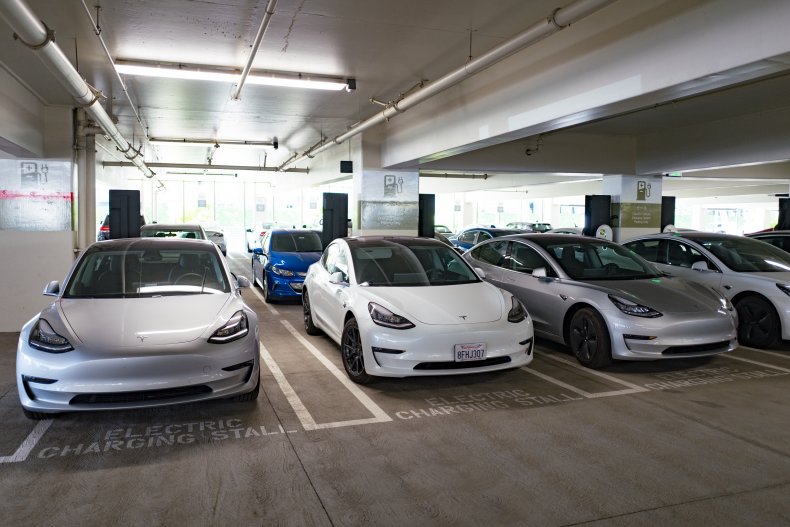Environmental activists and Democratic Party donors are cheering California's decision last week to institute a new ban on the sale of gas-powered vehicles by 2035. But among those who should be cheering the loudest is the Chinese Communist Party.
The big losers will be poor and working-class Americans. Car companies will adjust to whatever rules the government sets and pass on the costs to consumers.
Even considering the massive federal subsidies that—while still enriching their manufacturers and investors—artificially depress their exorbitant cost, electric cars are far more expensive than gas-powered ones. The average cost for a new electric car is $66,000, compared with $48,000 for an average new combustion engine car. Barring an unlikely increase in the supply of electric vehicles, working-class consumers will gradually be priced out of the new, and even much of the used, car market. As a New York Times article about the California law pointed out, electric cars are still "much too expensive for a vast majority of Americans."
Like President Joe Biden's decision to "forgive" student loan debts, this ban strikes one more blow against the poor and working class. It panders to the fears of the most educated and richest people about global warming while ignoring the needs and the welfare of those on the lower end of the economic spectrum.
That this rule is being implemented at a time of growing income inequality exacerbated by record inflation heightens the injustice of what liberal commentators falsely portray as a progressive measure.
It's also self-undermining. All of these electric cars will create massive demand for more electricity, requiring more carbon emissions from a power grid that is already overwhelmed by current demand. In the absence of a national embrace of nuclear power or miraculous advances in wind and solar power, millions more electric cars on California streets and highways will offer their owners an exercise in virtue signaling but won't cool the planet.
The measure is also a gift to the nation's most dangerous rival: China.

China currently is the source of the most essential component of non-combustion-engine cars: electric batteries. The Biden administration pretends it can fix this problem by encouraging (with more subsidies and tax breaks) the building of new factories in the United States. But the Chinese have already cornered the market on the mining of minerals, like lithium, cobalt, and nickel, that are necessary to build electric batteries.
Last fall The New York Times published a major investigative article that explained how the United States ceded control of these minerals in a series of disastrous transactions that gave the Chinese Communist Party a near-monopoly on them.
One such deal was the stealth Chinese acquisition from a failing American company of a mine in the Democratic Republic of the Congo that had the world's largest reserves of cobalt. Though the Times buried it in the middle of a dense story, one astonishing element of the tale was that Hunter Biden had a major financial interest in the firm that Beijing chose to facilitate the sale.
That fact is relevant when you consider that many major Democratic campaign donors and Wall Street firms that supported Biden for president stand to benefit greatly from laws that will validate their bets on electric vehicles.
Climate change activists are certain that over the next decade the costs of electric vehicles will fall. They also take it as a matter of faith that battery costs will decline and that the massive supply chain problems involved in the industry will also be magically resolved. But unlike the public's past embrace of new technologies like microwave ovens and cell phones, such assumptions about electric cars are primarily the function of government mandates, not consumer choices.
Even if we were to accept the lofty claims about the benefits of electric vehicles and ignore the inconvenient truth that producing the power needed to charge them might have an adverse effect on carbon emissions, there would still be the problem of creating the infrastructure required to make them usable, such as public charging facilities. And even if all that were accomplished by another inflation-feeding bout of uncontrolled government spending, there remains an inarguable fact that environmentalist rhetoric can't wish away. Working-class and poor consumers are going to find it harder and harder in the years ahead to afford overpriced cars built to satisfy ideological ends rather than consumer demand.
Other states should resist measures in which ruling elites punish those with less money in hopes of advancing a cause that most Americans think is less important than wages, jobs, and inflation. If gas cars are rendered scarce, the working class and poor will suffer and the winner won't be the planet, but Democratic Party donors and China.
Jonathan S. Tobin is editor in chief of JNS.org, a senior contributor to The Federalist and a columnist for the New York Post. Follow him on Twitter at: @jonathans_tobin.
The views expressed in this article are the writer's own.








